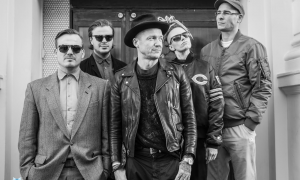Home » Jazz Articles » Live Review » Sona Jobarteh at the Herbst Theater
Sona Jobarteh at the Herbst Theater

Courtesy Schorle
Herbst Theater
2025 SFJAZZ Season
San Francisco, CA
April 4, 2025
Sona Jobarteh is quite a busy woman. In addition to leading her own band and creating her own albums, she frequently makes guest appearances on recordings, speaks as an activist before the United Nations, lectures at universities, and has organized the impressive Gambia Academy which provides education about the country's culture, traditions and history in addition to the standard curriculum.
Her principal instrument, the 22-string kora, is an iconoclastic instrument. Classified as a "double-bridge-harp-lute," it was traditionally played by West African male jali (griots) in the service of royalty. Jobarteh, to much acclaim, is taking the instrument to an entirely different level. Nowadays, the instrument is made with guitar machine heads, which limits tonal range but facilitates tuning—something which its precursor, the konso (adjusted with the help of leather rings), made notoriously difficult to do.
Jobarteh also comes from an impressive personal lineage. The granddaughter of Amadu Bansang Jobarteh, Jobarteh's cousin was the late legendary kora player Toumani Diabate. Coming of age in England (her mother Galina Chester, is English), Jobarteh began studying the kora at age three, first instructed by her older brother Tunde Jegede and, subsequently, by her father Sanjally Jobarteh. She has embraced her Mundang heritage, and maintains it contributes to the bluesy tones coming from her kora.
Following an introduction by SFJAZZ staff member Rebecca Mauleon, herself an accomplished musician, Oakland-based and Haitian-born percussionist Jeff Pierre took the Herbst Theater stage to solo on djembe, congas and talking drum. Accomplished guitarist Eric Appapoulay, an East Londoner of Mauritian heritage, then joined him onstage. Jamaican born bassist Andi McLean then appeared to his left.
After a tech adjusted the pickup on her kora, Jobarteh took the stage, launching into "Jarabi," arguably her most famous number. Her sonorous voice was augmented by Appapoulay's piercing amplified acoustic guitar, as Jobarteh moved to initiate the first of several call-and-response routines with the audience (who intoned "Woyiyo woyiyo jarabi, woyiyo woyiyo jarabi" on command).
Jobarteh told us that "Love is also a sacrifice," and the lyrics of "Jarabi," a traditional Mandinka love song, reflect this: "Love, love is like an alcoholic drink, and I am addicted to it / Love, love is a disease for which there is no cure ever / I'm hurting, hurting because of love, I'm hurting, hurting because of love!"
Moving on with "Mamamusu," a song dedicated to her grandmother, Jobarteh offered haunting vocals; Appapoula filled in with guitar, while Pierre hit the hand drums with expertise. "Oh, granny! / Though you are no longer with us / you will forever be remembered."
Before "Forayaa," Jobarteh told us about the difficulties involved with the struggles for change around the world. "I hope we will have the commitment to change. I adore men too, and our husbands, brothers and uncles can do so much to support us." She then introduced her 18-year-old son Sidiki Jobarteh-Codjoe, who took his place onstage behind his balafon, a gourd-resonated xylophone which dates back to the days of the Mandinka empire. Energetic drummer Xuval Wetzzler shined on the tune, while Jobarteh initiated another call and response with the audience.
The next tune "Musolu," paid tribute to the dedication of mothers, including activists, in the struggle for social change. Jobarteh informed us that "Lots of young people are losing their traditions in exchange for success. Traditions are not stagnant. Young people are also finding ways of making themselves relevant within the context of traditions." The tune commenced with an extended balafon passage before Jobarteh joined in, turning the song into a lovely mother-and-son duet.
Jobarteh then introduced the bluesy and evocative "Nga Kangwo" as "neither rock, pop, blues nor jazz but music from the heart." Guitarist and bassist both stood to deliver for "Dunoo," a song about how "with music comes responsibility." The lyrics stress African unity, and the need for artists to carefully consider the social implications of their art. For "Gambia," the evening's climax, Jobarteh related how often her country was often confused with Zambia. "Gambia"'s lyrics tout the nation's merits: "For if you forget your roots, you turn your back on who you are."
As the enthralling hour and a half of music came to a close, the lights came up, breaking the spell, and the enthused crowd exited.
Tags
Live Review
Harry S. Pariser
United States
Sona Jobarteh
Toumani Diabate
Tunde Jegede
Rebecca Mauleon
Jeff Pierre
Eric Appapoulay
Andi McLean
Xuval Wetzzler
PREVIOUS / NEXT
Sona Jobarteh Concerts
Support All About Jazz
 All About Jazz has been a pillar of jazz since 1995, championing it as an art form and, more importantly, supporting the musicians who make it. Our enduring commitment has made "AAJ" one of the most culturally important websites of its kind, read by hundreds of thousands of fans, musicians and industry figures every month.
All About Jazz has been a pillar of jazz since 1995, championing it as an art form and, more importantly, supporting the musicians who make it. Our enduring commitment has made "AAJ" one of the most culturally important websites of its kind, read by hundreds of thousands of fans, musicians and industry figures every month.

























